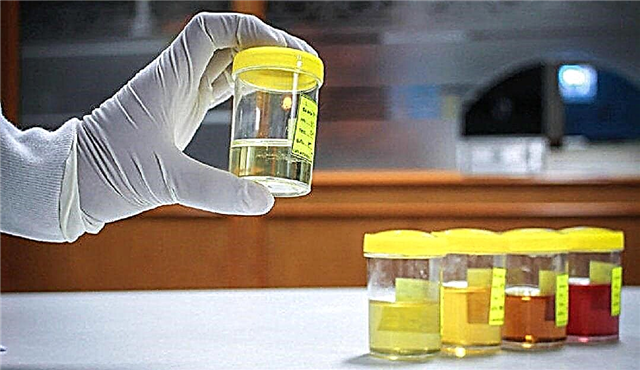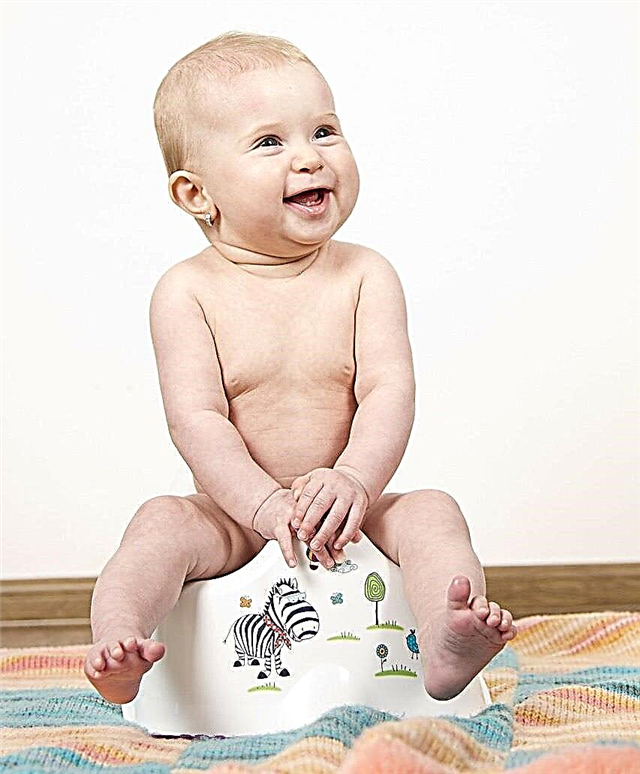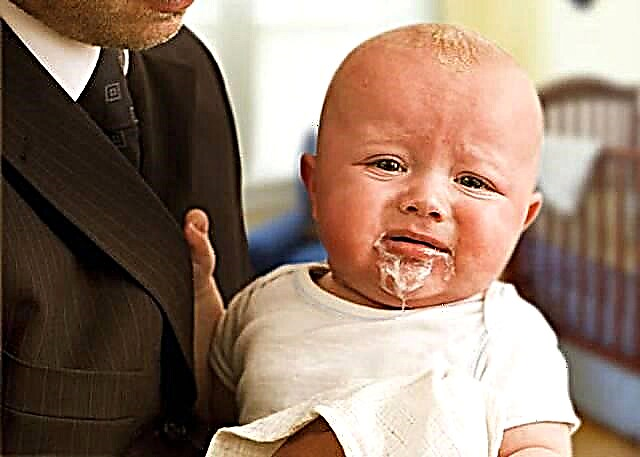Hearing the first laugh of your child is a very significant and long-awaited moment for all parents. Such a manifestation of emotions means that the baby already consciously reacts to the words, facial expressions of mom and dad, and also began to perceive all the objects around him. In addition, with the help of a smile, various sounds and laughter, the baby shows the first attempts to communicate with parents and other relatives. All mothers are looking forward to the moment when the child begins to laugh out loud, they want to know at what particular age this can happen.

Baby laughs
Baby laughter - development of feelings and emotions
The first emotions a newborn child expresses with the help of screaming and poorly coordinated movements of the limbs. From the fourth to fifth week of life, the baby begins to appear a kind of smile. There is also a complex reaction to all the actions that mom or dad takes. The kid freezes, concentrating on the face of the person who is bent over him, can throw up his arms, touch his legs, walk, squeak, groan.
From the eighth week after birth, the newborn increases the need for communication with mom and dad. During the first half of the year, the baby learns various ways to express emotions. Watching the baby, on his face you can see both a weak and a pronounced smile with a sharp revival of facial expressions. The child also tries to express his emotions using gestures.

Smile of a little child
What can make babies laugh
Laughter is one of the methods of communication between the baby and the parents; it can be caused by mother's affectionate words or a smile addressed to the child. When the little one already begins to laugh, he expresses his emotions, makes them available for understanding to all the people around him.
Feature of the nervous system
All newborn babies can already smile, but they do it unconsciously, due to the spontaneous contraction of the facial nerves. In the circle of scientists, such a smile is called involuntary or endogenous. It appears as a reaction to the satisfaction of all vital needs and testifies to the correct development and formation of the nervous system.
Repetition of mom or dad emotions
Babies very often look closely at the face of mom or dad. They take great pleasure in trying to imitate the sounds and mouth movements of adults. At two months, the baby is already able to copy the smile of his parents and thus begins to express his pleasure.

Newborn smiling in a dream
When real laughter appears
The only means of communication between the newborn and the parents is screaming. With the help of it, the baby can show his needs and, until a certain time, satisfy all the needs that arise in him. The further development of pleasant emotional feelings, such as smiling and laughter, is facilitated by a peaceful environment in the family, a feeling of comfort and complete safety.
At 8-12 weeks babies gurgle
At the end of the second month of life, the child begins to simply smile in response to his mother's smile or an affectionate word. This moment for all children occurs individually, but most often after the sixth week from birth. Since children are all different, in certain cases they may start smiling consciously sooner or later. A lot depends on the situation in the family, on how emotional the parents are, and how they communicate with each other.
Children try to copy everything after mom and dad, if they see frequent manifestations of affection and tenderness, then the period of a conscious smile will come by the end of the first month of life. Also, at the same time, the kids try to actively move their arms and legs. Over time, they begin to gag in response if someone from their relatives addresses them. Pediatricians call this period a revitalization complex and declare that this stage of emotional development in the life of a baby is formed starting from the 20th day after birth.
Additional Information. The above data on the appearance of the first laugh are considered only approximate. Alternatively, a fluctuation of the term from 5 weeks to 3 months is permissible. If the baby is already 3.5 months old, but he is not smiling yet, maybe he has insufficient tactile and voice contact with mom or dad.

The baby lies on its tummy
Laughter appears at 3-4 months
A joyful smile is a harbinger of laughter in an infant. The baby shows the first attempt to laugh after two months, but it often resembles a cluck, so it remains unnoticed by the parents. At 3-3.5 months, the baby begins to behave in a completely different way. The moment long-awaited by all mothers comes when the child is already laughing out loud. All babies develop on their own schedule and are completely different emotionally. Normally, this moment can occur in the interval from 20 to 30 weeks of life.
Laughter out loud is manifested in response to tickling, while stroking the tummy or throwing into the air, and also when the baby hears sounds that are unusual for him, uttered by mom or dad.
Note! If the baby is 3-4 months old, but he is not smiling yet, it is very important to find out the reason for the appearance of such a problem. Maybe there is a dysfunctional atmosphere in the family, and the baby is in a state of constant stress and frightened by everything that happens around.

Dad tickles baby
How to speed up the onset of laughter
There are several ways to stimulate the laughter of a baby:
- Gently stroke your tummy and ribs with your fingers and palms. This will help improve your baby's mood. The touch should be like a massage, you should not tickle the baby too much and bring to colic or hiccups.
- Many kids enjoy unusual sounds and unusual sensations. For example, you can blow the baby on the heels, kiss the tummy, or press your mouth to your stomach and blow out air with a sound. Also, the baby will be amused if mom or dad repeats "apchi" many times.
- The baby will very quickly learn to laugh if parents constantly make funny faces or utter bizarre sounds.
Important! Wanting to cheer the child, the main thing is not to overdo it and not to scare. You need to touch gently and without sudden movements, do not speak loudly and try to do it softly.

You can cheer your child up with a toy
If the kid does not laugh, does not smile
From the fact alone, whether a child is laughing or not, it is impossible to determine whether he is developing normally or whether he has problems. Several factors will affect gigginess: the intelligence of the baby himself, the attention of parents to him, as well as temperament and the habit of expressing emotions in the family as a whole.
Natural causes
There are several reasons:
- Immature nervous system. Here you just have to wait. If at five months the baby is still not laughing, then this is not a sign of developmental delay. It only says that his time has not come yet.
- Emotionally reserved dad and mom, as well as the rest of the family. If the child does not hear how his relatives laugh, he will not have someone to take an example from.
- The child has an inner seriousness and such a temperament. In this case, it will be very difficult to evoke emotions in the baby.
Wet diapers
When the baby is in an uncomfortable situation, he has wet diapers or a diaper that has not changed for a long time, what kind of laugh can we talk about. Instead of laughter, parents will hear a disgruntled or continuous scream. The child will calm down only when all the causes of the inconvenience are eliminated.
Worried about pain
If something hurts the baby, then he is clearly not laughing. He begins to scream desperately, bends his knees, becomes very restless, he can get gazes.
Brain problems
Lack of laughter can be a sign of organic brain damage. This situation occurs in children who were born prematurely, suffered a difficult birth, suffered from hypoxia during pregnancy, or they had a Rh-conflict with their mother. Also, the reasons may be cerebral hemorrhage, cerebral edema, ischemia, neurological pathologies.
Development lag
Lack of laughter can be caused by lag in physical development, as it is closely related to mental and emotional health. To correct the situation, you need to seek help from a neurologist. You may need to undergo a massage, or the doctor may prescribe other treatments.
The appearance of the first smile is an important stage in the process of personality formation, parents do not need to focus too much on this. If by three months the baby still has not learned to smile, it is necessary to show it to the pediatrician. After the examination, the doctor will decide whether you need advice from other specialists or not. If everything is normal with the baby, parents should reconsider their model of behavior, provide a healthy emotional environment in the family, then the child's smile and laughter will not be long in coming.



